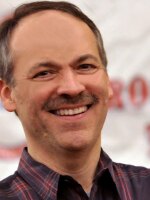
Will Shortz
NPR's Puzzlemaster Will Shortz has appeared on Weekend Edition Sunday since the program's start in 1987. He's also the crossword editor of The New York Times, the former editor of Games magazine, and the founder and director of the American Crossword Puzzle Tournament (since 1978).
Will sold his first puzzle professionally when he was 14 — to Venture, a denominational youth magazine. At 16 he became a regular contributor to Dell puzzle publications. He is the only person in the world to hold a college degree in Enigmatology, the study of puzzles, which he earned from Indiana University in 1974.
Born in 1952 and raised on an Arabian horse farm in Indiana, Will now lives near New York City in a Tudor-style house filled with books and Arts and Crafts furniture. When he's not at work, he enjoys bicycling, movies, reading, travel, and collecting antique puzzle books and magazines.
-
For each word given, name another that can follow it to complete a compound word or two-word phrase. The last and first letters of the first word must be the first and second letters of the second.
-
"Yes" is supposed to be the most pleasing word in the English language. If that's true, today's puzzle will be very pleasing indeed. Each answer is an anagram of "yes" plus two or three other letters.
-
Letters that start the name of a city are combined with letters that start the name of its state to spell a word. What are the city and state? For the word "latex," the answer would be Laredo, Texas.
-
Rearrange the letters in a four-letter word and a five-letter word to get a pair of synonyms. For example, given "time" and "night," you would say "item" and "thing."
-
In this week's puzzle, every answer is the name of an Academy Award winner or nominee for best picture. Using a given anagram, decipher the title of the film. The films will go from oldest to newest.
-
Every answer is a word or name of three or more syllables in which an interior syllable is an accented "la." Also: The answer to last week's puzzle.
-
For each familiar two-word phrase, use the first three letters of the first word and the first three letters of the second word to start two other words that have opposite meanings of each other.
-
Every answer is a made-up two-word phrase, where the second and third letters of the first word are switched to get the second word.
-
Every answer today is a word starting with the letters A-R, which you will identify from its anagram. For example, given AR plus ROB, the answer would be "arbor."
-
Every answer is a familiar two-word phrase or name, with the initials S.V. For example, given "noted Idaho ski resort," you would say "Sun Valley."






